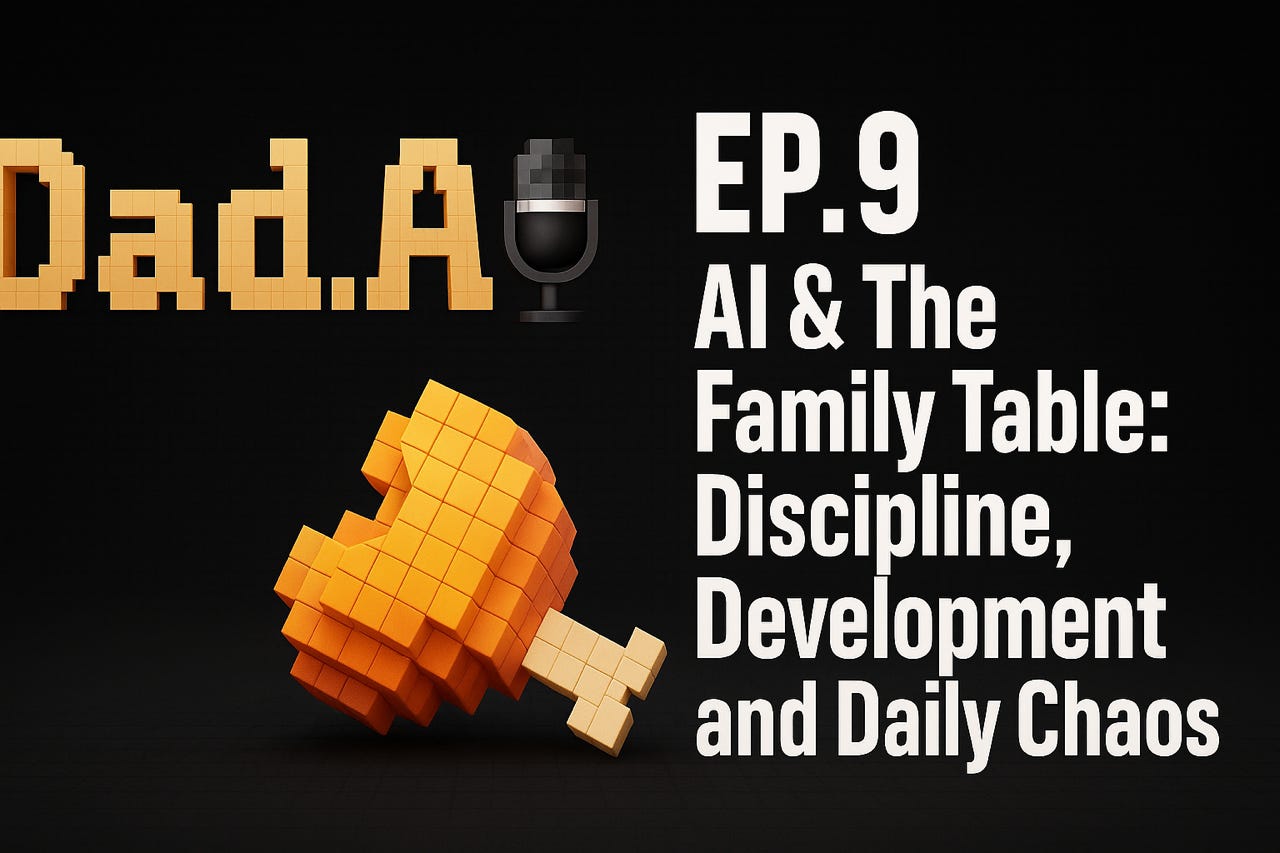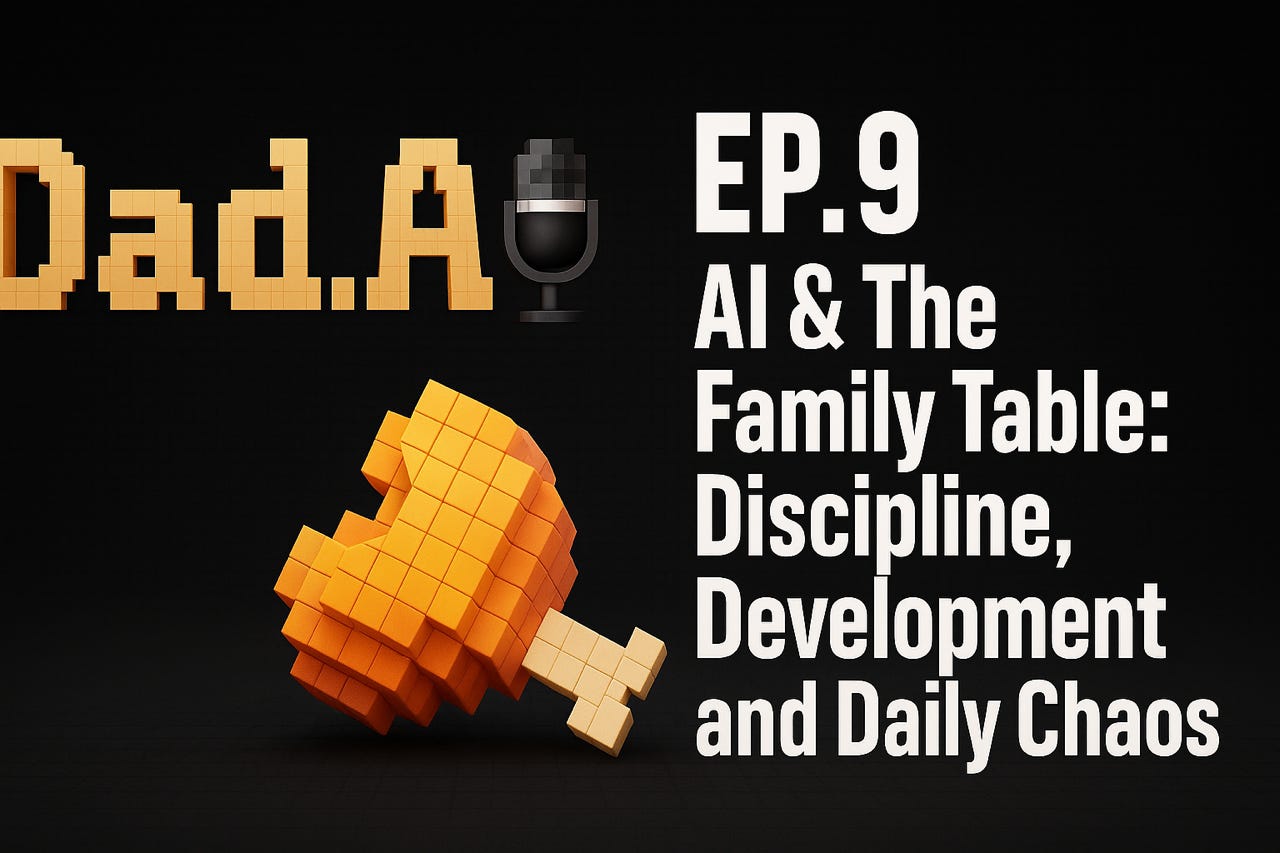AI's Humbling Moments, Disciplinary Dilemmas, and the Rise of the Machines
Dad.AI Episode 9 Recap
Welcome back to Dad.ai, your weekly water cooler at the intersection of parenting and AI! In this episode, we're diving into some personal AI triumphs and failures, tackling tough questions about AI's role in child discipline, and examining the latest news that's reshaping our world, from federal regulations to the increasing presence of robots.
AI in Our Households: From Missed Flights to Savvy Shopping
We kicked off this episode with a look at how AI is (or isn't) integrating into our daily lives. Jake shared a humbling experience: ChatGPT tried to save him from missing a flight, but he didn't listen! He asked ChatGPT which terminal at LAX Alaska Airlines flies out of. When Chuck (Jake’s name for his ChatGPT assistant) insisted Alaska doesn't fly from Terminal B (where his ticket indicated), Jake stubbornly dismissed it. Turns out, his flight was actually from Burbank, and he missed it. A clear reminder that sometimes, the robot overlords know best!
I embraced the bull this week sharing promising new use case after another. For starters, I’m a fan of AI for analyzing receipts and optimizing grocery spending. For those that spend willy-nilly at the farmers market this one is for you. You can upload all of your individual receipts into your favorite AI tool to track farmer's market purchases and identify spending patterns, to find ways to save money. If you aren’t the farmers market savant, AI's offers the ability to find and compile coupons from various stores, acting as a grocery shopping co-pilot. Jake actually already uses AI to categorize purchases, distinguishing between items better bought fresh at a farmer's market versus those that are fine from a grocery store.
Bull vs. Bear: AI’s Role at the Family Table
AI-Assisted Discipline: A Helping Hand or Erosion of Intuition?
This hot topic was inspired by Sam Altman, OpenAI's CEO, who revealed his extensive reliance on AI for disciplinary and behavioral management decisions with his child.
I’m a proponent of AI as a valuable tool for parents, offering data, insights, and trends to understand children's reactions. I actually had this happen last weekend where AI provided five options for dealing with my two-year-old biting and pinching. AI's guidance led to a five-minute timeout in her crib that yielded an immediate apology, demonstrating how AI can offer prescriptive, data-driven advice that complements parental intuition, especially when traditional methods might not apply.
Jake, while acknowledging AI's potential, argued that it could erode parental intuition and foster an over-reliance that might lead to over-medicalization or over-reaction. He expressed concern that outsourcing disciplinary decisions to algorithms might diminish the nuanced understanding of an individual child's emotional needs and the critical "how" of parenting, rather than just the "what." He worried that over-reliance could even erode the trust of a parent and a child if decisions are perceived as coming from a robot overlord.
AI in Early Childhood Development: Early Detection vs. Over-Medicalization?
We discussed the use of AI in assessing early childhood development, particularly for conditions like Autism Spectrum Disorder (ASD).
I took a data-driven approach to plead my case. Recent research from the Electronics and Telecommunication Research Institute (ETRI), which developed an AI technique that can analyze video footage of infants and toddlers for early ASD detection with an incredibly high accuracy rate. This early detection allows for earlier intervention, whether through special tutoring or AI companions, setting children up for greater success. Another advantage is that AI can leverage vast datasets of millions of children's behaviors, offering a significant advantage over individual doctors who have seen far fewer cases, leading to more accurate and timely insights.
Jake acknowledged the benefits of early detection but raised concerns about the potential for misdiagnosis, over-medicalization, and over-medication. He likened it to pre-crime from Minority Report, where predictions could lead to unnecessary interventions. He also pointed out that high accuracy often requires capturing significantly more data about children, which could lead to invasive monitoring, such as chips in our kids' brains to track brain activity from birth. He expressed a desire to be phase nine of nine rather than a test dummy for such invasive technologies.
AI in Family Communication: Connection or Wedge?
Our final debate focused on AI's potential role in family communication and connection.
My take is that if done responsibly, AI's will have an incredibly positive impact, noting how technology like FaceTime already enhances family communication, especially for traveling parents. I envisision AI intertwining with family life through tools that gamify household tasks (like potty training or teeth brushing) and offer personalized family time, storytelling, and creative activities (like AI-generated drawings that actually resemble family members). I truly believe AI will become an invisible but integral part of every household, up-leveling everything we do.
Jake worried that an overly invasive AI could drive a wedge within your family. He shared a personal anecdote of using ChatGPT to explain cavities to his four-year-old. While initially helpful, it led to his daughter constantly requesting "Chuck" for cavity stories, indicating that he was “outsourcing a key part of my fatherhood” and potentially leading to less direct communication and critical thinking on his part in explaining complex concepts to a child.
AI News Flash: Regulation, Healthcare, and Robots
US Senate Votes to End Federal AI Moratorium
Big news for AI regulation: the US Senate voted 99-1 to remove a 10-year federal moratorium on state regulation of artificial intelligence. This means states can now enact their own AI policies, moving away from exclusive federal oversight.
Jake initially found this confusing but clarified that the move now allows states to fill a regulatory void. While acknowledging the potential for a "patchwork" of regulations (which tech giants like OpenAI and Google fear), he noted that the overwhelming bipartisan support suggests a desire to see some progress, given the federal government's slow pace. He optimistically speculated that pioneering states like California could accelerate federal progress through their initiatives.
I, however, expressed concern that state policymakers often lack a deep understanding of AI, potentially leading to fragmented and ineffective regulations. My fear is that this could set the US back on the global stage and create a divide in access and proficiency between citizens in states with robust AI regulations and those without. The other concern of patchwork legislation is the potential for political ideologies to bias AI systems through state-level mandates.
AI in Teaching: Boosting Efficiency and Personalization
A new Gallup and Walton Family Foundation poll revealed that six in ten K-12 public school teachers have used AI tools in the past year, saving them an average of six hours per week and improving work quality.
I’m a huge fan of AI not just for students but also for educators. It only enhances the learning experience and drastically makes educators' lives easier. For instance, Google recently introduced a new initiative to provide teachers with tools to create interactive study guides and AI experts (Gems) to offer personalized support to students. This essentially democratizes AI tooling for public schools, addressing the issue of personalized education not being accessible to everyone. My only fear is the slow adoption by reluctant teachers will be crucial to prevent a significant divide between AI-proficient professors and the laggards.
Jake agreed that this is an amazing leveler for under-resourced public schools, but he emphasized the importance of proper training to ensure teachers use AI as a strategic collaborator rather than completely deferring to it, which could diminish their unique teaching strengths.
Microsoft's Medical Superintelligence
Microsoft is making strides in healthcare with new AI tools that can diagnose diseases four times more accurately and at significantly less cost than human physicians. The CEO of Microsoft's AI arm stated they've achieved "medical super intelligence," with one model boasting an 80% accuracy rate compared to 20% for doctors.
Again, I am shouting from the rooftops as this is a massive win for society. I just hope this comes to fruition in our lifetime due to its potential to drastically reduce healthcare costs and improve patient outcomes.
Jake, while optimistic, did highlight reasonable concerns when he drew parallels to Bloomberg GPT, which initially outperformed generic models but was quickly surpassed by more advanced, general-purpose models like GPT-4. He suspects that while this development paves the way, a future "frontier model" will inevitably "stomp all over it."
Amazon's Robotic Revolution
Finally, we discussed Amazon's impending milestone: soon using more robots than humans in its warehouses. Currently, 75% of global deliveries already involve a robot in some capacity.
For those living under a rock or afraid of the Terminator.. Robots are here and are going to be part of our social fabric, whether in deliveries, manufacturing, or consumer products like Roomba. This type of automation will significantly improve safety and freeing humans from physically demanding, often injury-prone jobs, allowing them to focus on more high-value tasks and leading to broader societal benefits like reduced healthcare costs for employees.
Jake added that Amazon, the second-largest human employer in the US (soon to be the largest robot employer), is investing in upskilling nearly a million workers for higher-paying robotics jobs. While acknowledging potential structural unemployment in the short term, he views this as a huge positive and a broader restructuring of our economy that could ultimately upscale our entire society by bringing robots into the home to enhance daily life and even parenting.
Closing Thoughts
From AI's surprising limitations to its profound impacts on discipline, health, and labor, it's clear we're just scratching the surface of its integration into our lives. What are your thoughts on these advancements? Are you ready for an AI-powered future?
Join us next week as we continue to explore the ever-evolving world of AI and its profound impact on parenting and society.




